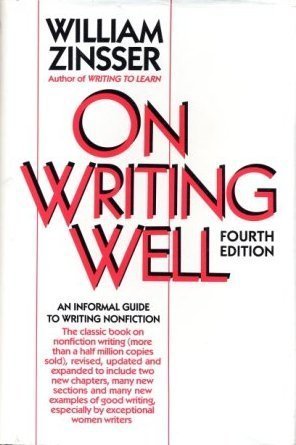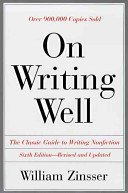

Very few sentences come out right the first time, or even the third time.

This is where the game is ultimately won or lost: in the hundreds of small details that tell the reader, if only subconsciously, that he’s in the hands of a careful writer.” Every component in a piece of writing must do new work, and the transitions must pull the reader from one sentence to the next without noticing the tug. But all your elegant sentences will add up to chaos if you don’t remember that writing is linear and sequential, that logic is the glue that holds it together, that tension and pace are crucial. It’s a more subtle skill than writing elegant individual sentences and is often neglected.


“Learn to take as much pride in organizing your article as you do in writing it. I often think we should teach children simple logic before we teach them how to write… Clear thinking becomes clear writing: one can’t exist without the other.” Anyone who thinks logically should be able to write well anyone whose thinking is fuzzy will never write well. “The ability to think logically is one of the fundamental skills in nonfiction writing. I love Zinsser’s use of the words viscous and glutinous (thick and sticky) to describe writing which does not flow freely.” “Short paragraphs put air around what you write and make it look inviting, whereas one long chunk of type can discourage the reader from even starting to read… Writing that will endure tends to consist of words that are short and strong.” And they usually occur, ironically in proportion to education and rank.” Every word that serves no function, every long word that could be a short word, every adverb that carries the same meaning that’s already in the verb, every passive construction that leaves the reader unsure of who is doing what-these are the thousand and one adulterants that weaken the strength of a sentence. “The secret of good writing is to strip every sentence to its cleanest components. But otherwise the book stands up to the test of time (and there’s a newer edition available).ĬLARITY AND SIMPLICITY. While recently rereading it I was amused by Zinsser’s description of a new invention called a word processor-almost like someone describing their car as a horseless carriage. My father gave me a copy of the third edition of this book when I graduated from high school in the 1980s. In a nutshell, the message is that good writing is clear, simple, and unpretentious. William Zinsser taught nonfiction writing at Yale and he was editor of Book-of-the-Month Club. Best Chat GPT Prompts For Writing Articles S.On Writing Well: An Informal Guide to Writing Nonfiction


 0 kommentar(er)
0 kommentar(er)
